Female workers made to strip over used sanitary padpublished at 16:20 BST 6 July 2023
Kenyan cheese factory employees were reportedly made to undress after a pad was put in the wrong bin.
Read MoreKenyan cheese factory employees were reportedly made to undress after a pad was put in the wrong bin.
Read More Favour Nunoo
Favour Nunoo
BBC News, Accra
Amnesty International Ghana has condemned lawmakers in the country for unanimously supporting a redrafted anti-LGBT bill which seeks to impose a three-year prison sentence on people who identify as LGBT.
As we reported earlier, Ghana's parliament backed amendments to the bill which also means that people who campaign for LGBT rights could face up to 10 years in jail.
Amnesty Ghana director Genevieve Partington says the bill, which is not yet law, infringes on the rights of some citizens.
"The bill clearly violates on a lot of human rights... it’s infringing on freedom of expression; it’s infringing on freedom of association."
She also asked whether, as "an ally of the LGBTI community", she could face spending several years in prison.
The human rights organisation says it is about time the country accepts people from the LGBT community.
 Richard Hamilton
Richard Hamilton
BBC World Service Newsroom
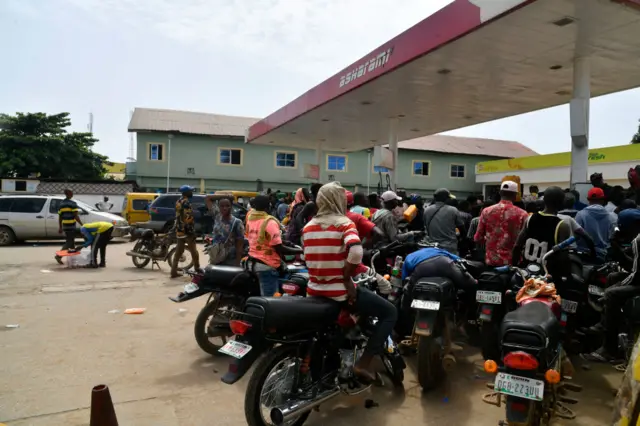 Image source, AFP
Image source, AFPIn May there were long queues of people trying to get fuel after President Tinubu announced an end to the subsidy
The fuel industry regulator in Nigeria says average daily petrol consumption has fallen by nearly a third since President Bola Tinubu scrapped a fuel subsidy when he took office in May.
The financial support had kept petrol prices low for decades in Africa's biggest economy but became increasingly expensive for the country.
The government spent $10bn (£7.8bn) on the subsidy last year - increasing its deficit.
The regulatory authority (NMDPRA) says since the subsidy ended, a black market in neighbouring Cameroon, Benin and Togo that relied on petrol smuggled out of Nigeria has also collapsed.
 Esther Akello Ogola
Esther Akello Ogola
Women's affairs journalist, Kenya
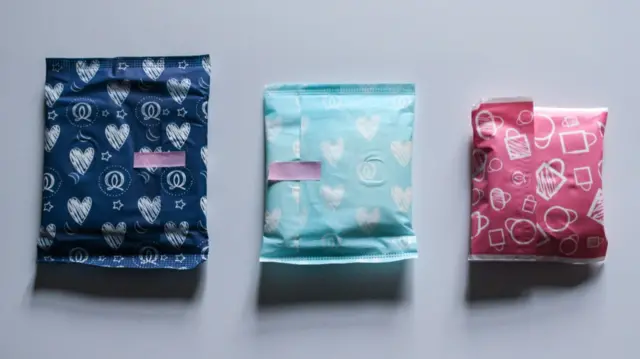 Image source, Getty Images
Image source, Getty ImagesThe incident started after an employee allegedly put her sanitary pad in the wrong bin
Three people working at a Kenyan food manufacturer have been arrested following the alleged forcible stripping of female employees to check who was on their period, local media report.
In a statement, external on its website Brown's Food Company said it was "saddened" and that the matter "does not reflect the procedures of the company as a whole".
The incident, which allegedly happened on 4 July, got public attention after Senator Gloria Orwoba called out the company on a Facebook post, for period shaming and sexual harassment., external
According to the post, a senior official at Brown's is said to have found a sanitary towel in the wrong bin.
The official was then accused of assembling the department’s female employees and asking them to confess to the incident.
After attempts to get a confession were unsuccessful, the senior official is alleged to have asked the women to strip to show who was on their period, Senator Orwoba said in her post.
Brown's said it has suspended the accused "pending an investigation".
Read more:
The leak in a shanty town near Johannesburg is linked to illegal gold mining in the area.
Read More Azeezat Olaoluwa
Azeezat Olaoluwa
BBC News, Lagos
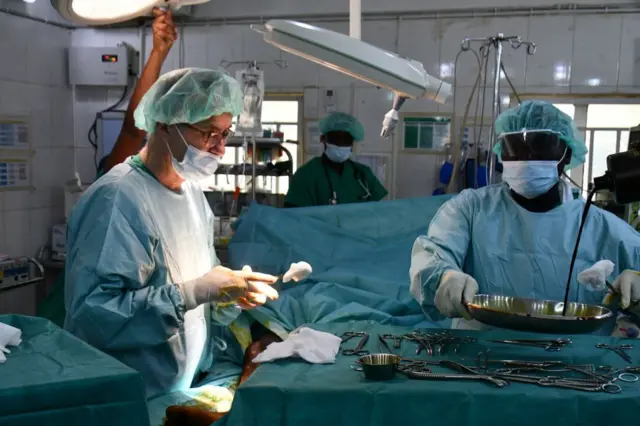 Image source, AFP
Image source, AFPNigerian doctors want a pay increase and more staff in hospitals
Nigerian doctors working in public hospitals have given the government a two-week ultimatum to fulfil all agreements made with them over salary and other issues.
The previous government had promised to resolve the matters after a five-day warning strike in May but nothing was done before President Muhammadu Buhari left office at the end of that month.
In a statement, the Nigerian Association of Resident Doctors (Nard) said that two weeks' notice was enough time for authorities to address the problems.
This comes a month after the doctors said they would give the new government time to look into it.
Their demands include a 200% salary rise, payment of outstanding arrears, payment of the 2023 Medical Residency Training Fund and adequate replacement of clinical staff to cushion the effect of staff shortages.
The association has warned that if all its demands were not met by 19 July, it "cannot guarantee industrial harmony in the health sector" across the country.
Poor funding, inadequate facilities and low remuneration of health workers have led to many health professionals seeking opportunities abroad.
Read more: Nigeria cost-of-living crisis sparks exodus of doctors
 Dorcas Wangira
Dorcas Wangira
Africa health correspondent
 Image source, AFP
Image source, AFPThe Mosquirix vaccine has already been used in pilot schemes
The World Health Organization (WHO) and its partners say around 18 million doses of the world's first malaria vaccine will be delivered to 12 African nations by 2025.
Among them are Malawi, Ghana and Kenya, where the Mosquirix vaccine has already been used in pilot schemes.
With demand outstripping supply, priority will go to countries with the greatest need, and where maximum impact will be achieved.
Mozambique and Sudan have been excluded because of their high vaccine drop-out rates.
The WHO says the vaccine - developed by the British firm GSK - could save one life for every 200 children vaccinated.
Malaria kills around half a million African children under five each year.
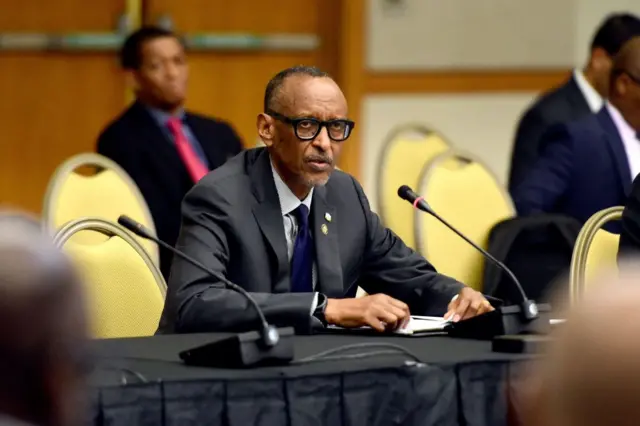 Image source, AFP
Image source, AFPPresident Kagame attended Caricom on Wednesday, which is currently celebrating its 50th anniversary
Rwandan President Paul Kagame has pushed for closer ties, external between Caribbean and African countries at the 45th Caribbean Community (Caricom) conference in Trinidad and Tobago, and called on both regions to stop blaming others for their problems.
"We should not be comfortable blaming others for our problems, including the harm we inflict on ourselves," President Kagame said.
"The starting point here is how we govern our own individual countries, striving to be the best we can be, with a culture of accountability," he added in a statement.
"We need to come together in real terms and focus on concrete initiatives which address the challenges that nations like ours face today," Mr Kagame said.
He highlighted that both regions need to advocate for more inclusive borrowing terms when countries need to take loans and greater cooperation on tackling climate change.
He also spoke about opportunities for both regions to improve connectivity when it comes to "transport and telecommunications".
He also mentioned Haiti, which Rwanda has previously said it was willing to support in terms of security and peacekeeping, according to the Miami Herald., external
President Kagame said his country "cannot look away" and that Rwanda's own painful history shows that "nothing is beyond repair".
Haiti has descended into increasing lawlessness since the assassination of President Jovenel Moïse in July 2021.
Senegal's Kalidou Koulibaly and Edouard Mendy are the latest stars to move to Saudi Arabia but Africans already have a proud record of scoring success in the country.
Read More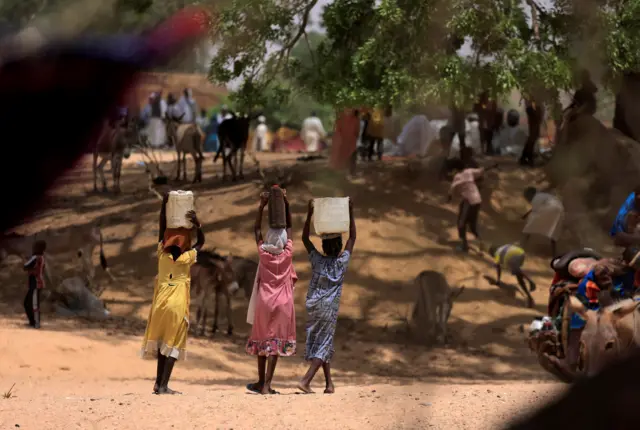 Image source, Reuters
Image source, ReutersThe UN says it has received more than 20 reports of conflict-related sexual violence
The United Nations has condemned what it called rising sexual violence against women and girls in Sudan in more than two months of conflict.
The UN human rights office in Sudan said it had received credible reports of more than 20 incidents of conflict-related sexual violence against at least 57 women and girls.
It said that in one incident as many as 20 women were raped in the same attack.
The UN's chief humanitarian official, Martin Griffiths, said it was unconscionable that Sudan's women and children were being traumatised in this way.
 Thomas Naadi
Thomas Naadi
BBC News, Accra
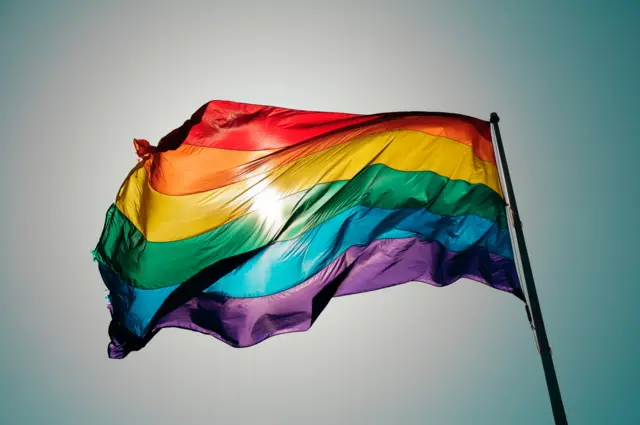 Image source, Getty Images
Image source, Getty ImagesPeople in Ghana who campaign for LGBT rights could face up to 10 years in jail
Parliament in Ghana has backed a proposed amendment to an anti-gay bill that would make identifying as LGBT punishable by a three-year prison sentence.
People who campaign for LGBT rights could also face up to 10 years in jail.
The amendments were backed by a cross-party group of MPs, but will be scrutinised again before becoming law.
One female MP who dissented was heckled into submission.
Gay sex is already illegal in Ghana.
The proposed legislation has faced condemnation at home and abroad. Critics say it infringes on rights guaranteed in Ghana's constitution.
Supporters say it will help preserve Ghanaian values.
Multiple lawsuits have also been filed to challenge the bill in the country’s courts.
Read more about LGBT rights in Africa:
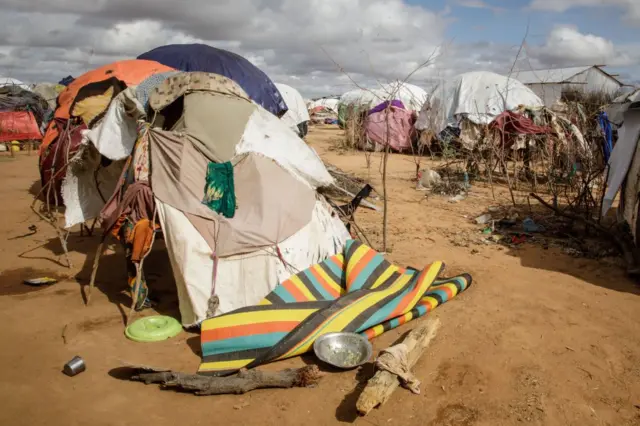 Image source, AFP
Image source, AFPKenya says it will start integrating refugees who have been staying in camps
The Kenyan government says it's delaying the reopening of its border with Somalia, after attacks on its soil attributed to the Islamist militant group al-Shabab.
Interior Minister Kithure Kindiki said the phased reopening, external of border posts along the lengthy frontier would not go ahead as announced in May.
He said the decision has been informed by the "recent incidents of threats and cases of insecurity in the frontier counties".
It comes as five civilians and eight police officers were killed in separate incidents near the border last month.
The border was initially closed in 2011, because of attacks by al-Shabab, which has been waging an insurgency against the central government in Mogadishu.
The minister also announced Kenya would in a few weeks begin integrating refugees who have been staying in camps, as part of a new way of managing them.
He said the new system would allow authorities to weed out "agents of terror and criminals who are exploiting the available refugee spaces to hurt host communities".
Our proverb of the day:
Quote MessageA fool is like a beehive."
A Kikuyu proverb from Kenya sent by Nancy Njeri Kamau in Detroit, the US
We'll be back on Thursday
That's all from the BBC Africa Live team for now. There will be an automated news feed here until we're back on Thursday morning.
In the meantime you can get more from BBCAfrica.com and listen to the new BBC Focus on Africa podcast.
A reminder of our wise words of the day:
Quote MessageIf an argument arises over who owns a stick, it is the person who cut it off the tree that can claim it."
An Oromo proverb from Ethiopia sent by Assefa Wodajo
Click here to send us your African proverbs.
And we leave you with this photo of migrants waiting for a train at the station in Sfax earlier on Wednesday as they flee racial unrest in the Tunisian city:
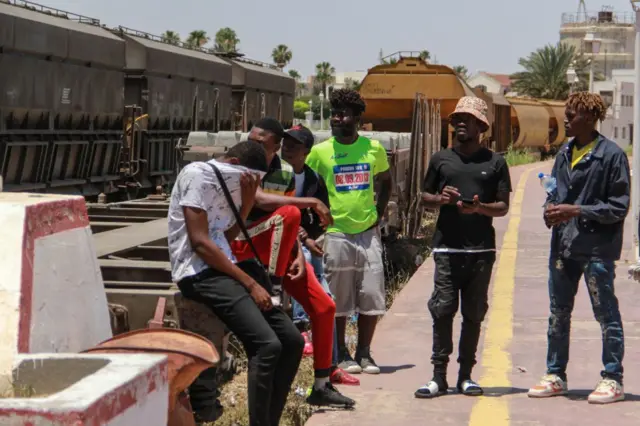 Image source, AFP
Image source, AFP Veronique Edwards
Veronique Edwards
BBC News
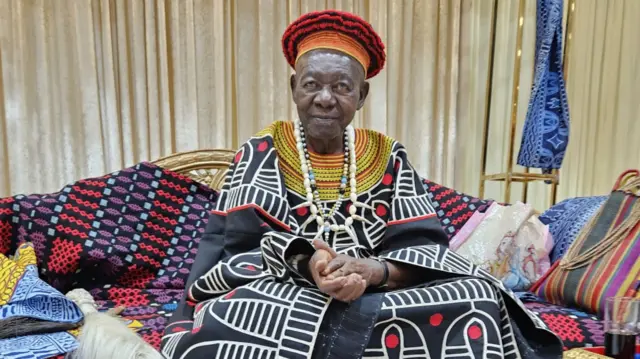 Image source, Veronique Edwards/BBC
Image source, Veronique Edwards/BBCThe Fon of Akum, George Ndikum II, has been on the throne for 65 years
A Cameroonian king is visiting the UK to try and raise money to help those who have fled the separatist conflict to settle in his small kingdom.
The Fon of Akum, George Ndikum II, has been on the throne for 65 years in an area of North-West Cameroon, one of two English-speaking regions where a secessionist rebellion has been raging for the last six years. The conflict was sparked by those in the two Anglophone regions who have long felt marginalised by the country's French-speaking majority.
Akum, a lush highland village where most people make their living by farming, is struggling to cope with the influx of those who have lost their homes in the war, which Amnesty International said in a report this week involves rampant human rights violations and other crimes including executions, torture and rape.
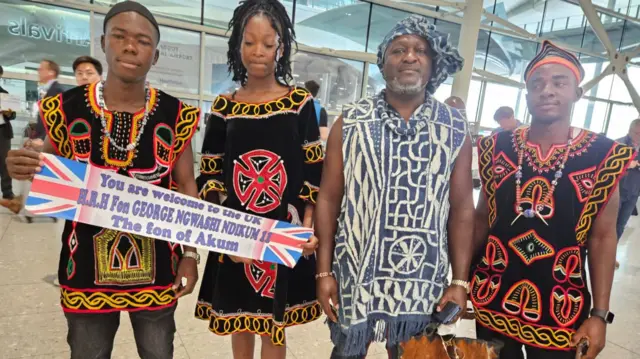 Image source, Veronique Edwards/BBC
Image source, Veronique Edwards/BBCPeople from Akum came to Heathrow Airport to welcome the Fon to London last week
The Fon of Akum has been feted since his arrival last Wednesday by London’s Cameroonian community.
Events during the monarch’s visit are focussed on raising funds for displaced children to give them access to education and to provide food.
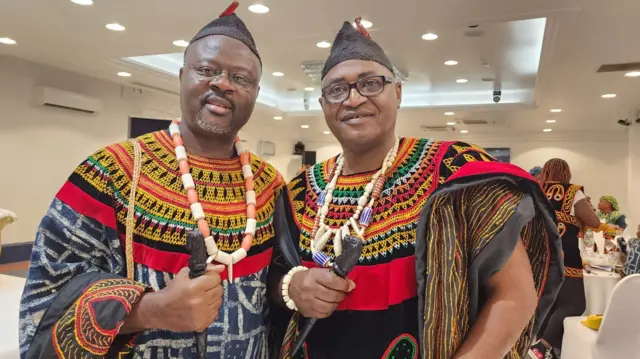 Image source, Veronique Edwards/BBC
Image source, Veronique Edwards/BBCIt is the first Akum General Convention to be held and people came from around the world to attend
“Every contribution, no matter how small, holds immense power. Like the drops of rain that come together to form a river, our collective efforts can create a powerful current of change,” said Charles Mambo, UK president of the Akum Welfare Association, during a gala event that brought hundreds of people from around the world for the first Akum General Convention.
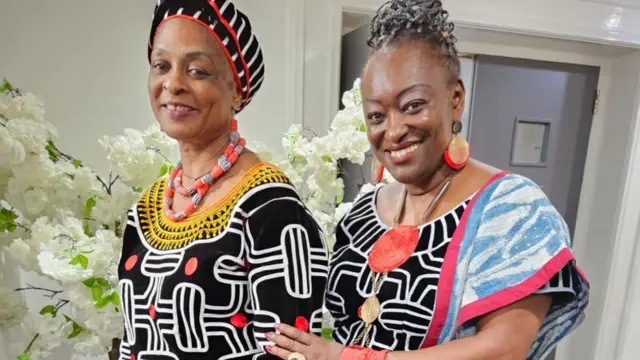 Image source, Veronique Edwards/BBC
Image source, Veronique Edwards/BBCMany attending the event on Saturday wore beautiful woven designs from the North-West region known as "toghu"
“As the Akum people say, ‘A tree is only as strong as its roots.’ Let us strengthen the roots of these children, allowing them to grow tall and strong, capable of weathering any storm that comes their way,” he said.
The Fon's visit continues in London, where he is attending various events, until this weekend.
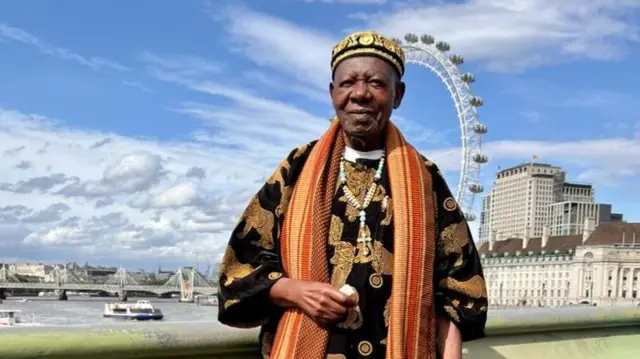 Image source, Veronique Edwards/BBC
Image source, Veronique Edwards/BBCThe Fon is in London for 10 days
Emery Makumeno
BBC News, Kinshasa
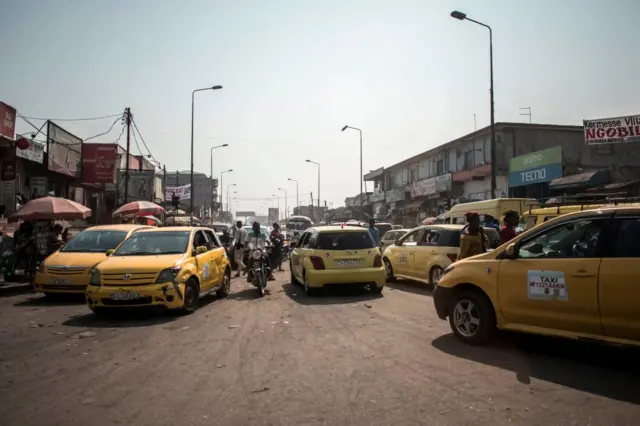 Image source, AFP
Image source, AFPPeople now fear taking taxis around Kinshasa because of the kidnappings
A trial has started in the Democratic Republic of Congo involving 27 people who have been accused of involvement in the kidnapping of people travelling in taxis in the capital, Kinshasa.
Among the accused are four police officers, six young women who allegedly lured the victims and 17 others.
Some of the victims were robbed and released, whereas others were held without consent for days until a ransom was paid.
There are at least 30,000 registered taxis in Kinshasa - which is Africa's third largest metropolitan city after Cairo and Lagos.
It is commonplace for Kinshasa residents to feel afraid when taking taxis.
It is also a particular cause for concern for the authorities, who are gearing up for the city to host the Francophone Games - a competition featuring sports and arts from French-speaking countries around the world.
The games start on 28 July.
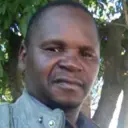 Jose Tembe
Jose Tembe
BBC News, Maputo
 Image source, Getty Images
Image source, Getty ImagesMethylene blue is a synthetic dye
A school in Mozambique is the regional winner for Africa in the first phase of a prestigious global science competition.
Hundreds of students from around the world took part in the Cambridge Upper Secondary Science Competition to find sustainable solutions to real-life problems.
The team from Willow International School in the capital, Maputo, found a way of removing methylene blue dye from water.
Methylene blue is a synthetic dye which when released from factories into lakes and rivers, kills aquatic life and poses a threat to public health.
According to the students, the conventional technologies that are used to treat such wastewater are expensive and complex.
Over nine months they tested the effectiveness of using the shrub-like plant pyracantha coccinea to remove the dye.
One of the students said they were extremely happy to have come top of Africa in the competition in what was a “fantastic and challenging experience”.
The Willow International’s deputy head teacher said the school was very proud of them and thanked the competition’s organisers in the UK for “giving students opportunities to grow in a way where everyone can shine”.
The overall world winner of the competition will be announced in December, external.
 Nomsa Maseko
Nomsa Maseko
BBC News, Johannesburg
 Image source, Getty Images
Image source, Getty ImagesThe foundation set by up Patrick Motsepe and his wife Precious Moloi is making a donation to Banyana Banyana
The president of the governing body of African football has intervened to resolve a pay dispute between the South Africa women’s football team and the national federation.
The team’s preparations for this month’s World Cup were thrown into disarray before the final warm-up game against Botswana at the weekend. Banyana Banyana boycotted the match.
They also refused to sign contracts after raising bonus issues.
Fifa has guaranteed each player $30,000 (£24,000) for taking part in the tournament but this figure was not included in the contracts the players were given to sign.
Patrice Motsepe, a wealthy South African businessman who is also the president of Confederation of African Football (Caf), and his wife Precious Moloi brokered a deal between the two parties, with a donation from their foundation going towards bonuses for the players.
The Women's World Cup is due to start later this month in Australia and New Zealand.
Muthoni Muchiri
BBC News
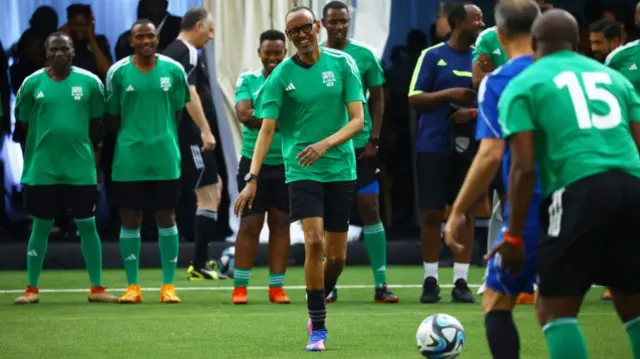 Image source, Getty Images
Image source, Getty ImagesRwanda's President Paul Kagame (centre) is a keen football fan
Rwanda's President Paul Kagame has called for urgent action to address issues plaguing Rwandan football, including the presence of witchcraft.
During the televised "Ask the President" session with the Rwanda Broadcasting Agency (RBA) on Tuesday, Mr Kagame said some individuals, particularly coaches, were involved in unethical practices such as witchcraft.
“Instead of adequate training, you find them engaging in witchcraft or bribery, which is the first thing that needs to be addressed,” he said.
Despite substantial investment in the sports sector, the country's teams have struggled to achieve success.
Rwanda's national football team have only qualified for the Africa Cup of Nations once, in 2004, and are currently bottom of their qualifying group having yet to win a match.
Mr Kagame is a well-known football fan, and follows English club Arsenal. Rwanda's Tourism Authority has had a controversial £30m ($42m) sponsorship deal with the club since 2018.
 BBC World Service
BBC World Service
Newsroom
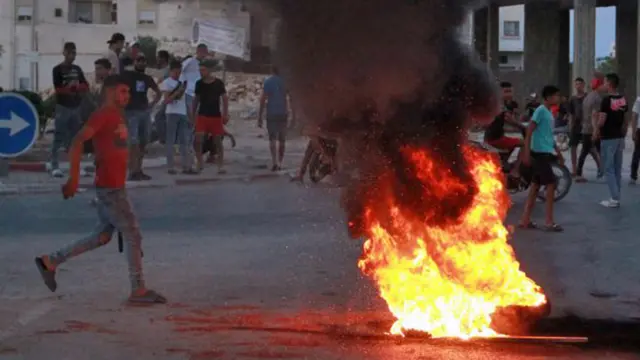 Image source, AFP
Image source, AFPTunisian men blocked the road to migrants by setting tyres alight on Tuesday
Migrants from sub-Saharan Africa have been attacked in the Tunisian city of Sfax, with dozens reportedly wounded.
The unrest was triggered by the killing of a Tunisian man on Monday during an altercation with several migrants.
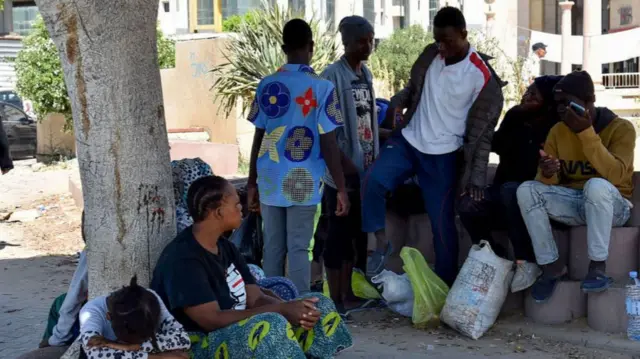 Image source, AFP
Image source, AFPMany migrants from sub-Saharan Africa have been evicted in Sfax in the last few days
A non-governmental group said that in reprisal attacks, some migrants were thrown from balconies and others attacked with swords.
Women and children were among those targeted.
Witnesses say that dozens have been forced out of the city, which is a key departure point for people seeking to enter the European Union by sailing to the Italian island of Lampedusa.